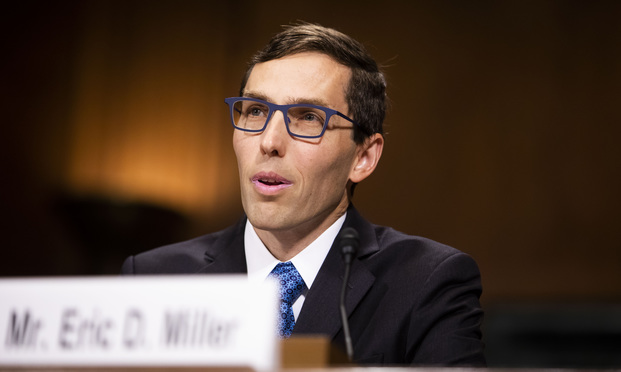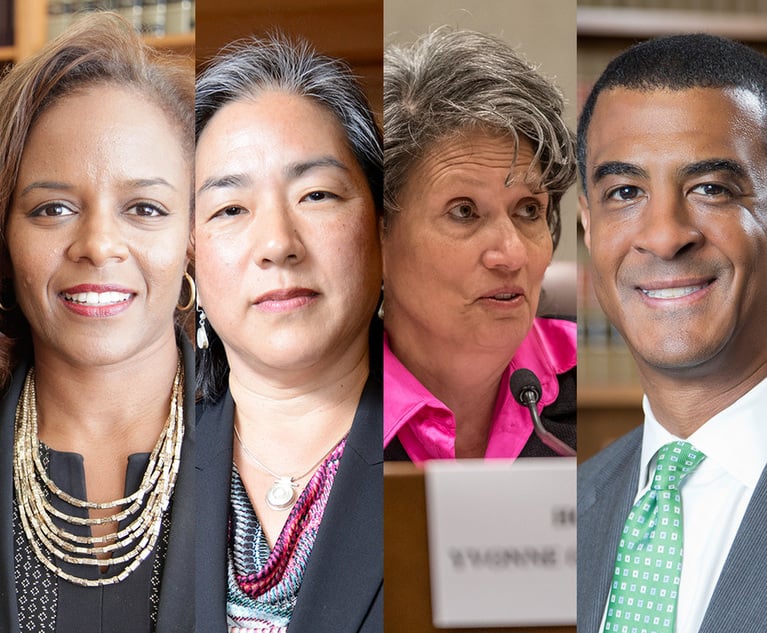Trump Appointee Calls Lack of Consideration of Dangers to Asylum Seekers 'Particularly Troubling'
Judge Eric Miller, confirmed to the Ninth Circuit last year, wrote separately in an opinion upholding an injunction against a Trump administration rule restricting asylum for certain migrants to say the reasons for its adoption was "contradicted by the agencies' own record."
July 06, 2020 at 03:22 PM
6 minute read
The original version of this story was published on The Recorder
 Eric Miller testifies before the Senate Judiciary Committee during his confirmation hearing to be U.S. Circuit Judge for the Ninth Circuit, on Oct. 24, 2018. Photo: Diego M. Radzinschi/ALM
Eric Miller testifies before the Senate Judiciary Committee during his confirmation hearing to be U.S. Circuit Judge for the Ninth Circuit, on Oct. 24, 2018. Photo: Diego M. Radzinschi/ALM
A panel on the U.S. Court of Appeals for the Ninth Circuit upheld an injunction against a Trump administration rule restricting asylum for certain migrants, finding authorities ignored a "mountain of evidence" on the potential dangers those migrants can face.
All three judges on the panel for Monday's ruling agreed the policy was not "consistent with" immigration law and that officials were "arbitrary and capricious" in enacting the rule last year. Judge Eric Miller, appointed to the bench by President Donald Trump last year, wrote separately to express concerns about officials not considering a significant amount of evidence on the dangers posed to asylum seekers in other countries.
The rule required migrants to apply for, and be denied, asylum in countries they pass through before arriving at the U.S.-Mexico border.
The court's majority opinion, authored by Clinton-tapped Judge William Fletcher, and mostly joined by Miller and Senior Judge Richard Clifton—nominated by President George W. Bush—highlights reports on the dangers that migrants face in traveling to the southern border.
"With limited exceptions that are at best unresponsive to the question, the cited evidence consists simply of an unbroken succession of humanitarian organizations explaining why the government's contention is ungrounded in reality," Fletcher wrote of DOJ arguments in favor of the rule.
"In sum, the bulk of the administrative record consists of human rights organizations documenting in exhaustive detail the ways in which those seeking asylum in Mexico are (1) subject to violence and abuse from third parties and government officials, (2) denied their rights under Mexican and international law, and (3) wrongly returned to countries from which they fled persecution," he continued. "Yet, even though this mountain of evidence points one way, the agencies went the other—with no explanation."
The majority opinion also rejected the Justice Department lawyers' invocation of an article about asylum seekers traveling to the border as evidence that the migrants don't have a valid claim of asylum in the U.S., saying the report "does not even remotely suggest that the aliens' preference to apply for asylum in the United States rather than Mexico had any bearing on whether they had a credible fear of persecution that could support a valid claim to asylum."
"In sum, the agencies' conclusion that an alien's failure to apply for asylum in Guatemala or Mexico justifies an assumption that the alien does not have a valid asylum claim, and a categorical adverse credibility finding, ignores a long line of cases holding that aliens are not required to apply for asylum in countries they pass through on their way to the United States; ignores the fact that a preference for asylum in the United States rather than Mexico or Guatemala is irrelevant to the merits of an alien's asylum claim; and ignores extensive evidence in the record documenting the dangerous conditions in Mexico and Guatemala that would lead aliens with valid asylum claims to pursue those claims in the United States rather than in those countries," the opinion reads.
In his concurring opinion, Miller further countered Trump administration officials' claims that the asylum restriction is meant to filter out illegitimate claims because the migrants could seek protections in other countries, writing that the "premise is contradicted by the agencies' own record."
He wrote that administration lawyers did not present evidence that could show authorities considered both the strain on the country's immigration system and the dangers posed to migrants, and the court "cannot defer to a choice the agencies did not acknowledge making."
"The agencies' deficient explanation is particularly troubling because the rule represents such a major change in policy—perhaps the most significant change to American asylum policy in a generation," Miller wrote. "Having compiled a record that contained extensive evidence of safety concerns, particularly with respect to Mexico, the agencies were required to give the safety issues more consideration than a single paragraph in the rulemaking that does not meaningfully engage with the critical question: whether an applicant could safely apply for asylum in Mexico."
Miller also took issue with the scope of the injunction, arguing it should not apply to all asylum seekers, but only to those who are "bona fide clients" of the immigration groups challenging the restriction. He said past precedent in the Ninth Circuit "does not compel us to say that the harms asserted by these plaintiffs are sufficient to support the issuance of a universal injunction."
Clifton also issued a brief concurring opinion, writing that other opinions issued by the Ninth Circuit on the scope of injunctions in immigration cases were binding on Monday's ruling. "To the extent that our opinion in this case expresses agreement with or affirmative support for the reasoning behind the relevant portions of those opinions, I do not join this opinion," he wrote.
Monday's opinion was issued days after a trial judge in Washington, D.C., struck down the same rule in a separate case. U.S. District Judge Timothy Kelly of the District of Columbia, tapped by Trump for the federal bench in 2018, criticized Justice Department attorneys for failing to present much evidence to back their claim that not allowing the rule to go through a required notice-and-comment period would lead to a surge of asylum seekers at the southern border.
"At bottom, as plaintiffs point out, defendants—'despite studying migration patterns closely'—have 'failed to document any immediate surge that has ever occurred during a temporary pause in an announced policy.' That failure is striking," Kelly wrote in last week's opinion.
This content has been archived. It is available through our partners, LexisNexis® and Bloomberg Law.
To view this content, please continue to their sites.
Not a Lexis Subscriber?
Subscribe Now
Not a Bloomberg Law Subscriber?
Subscribe Now
NOT FOR REPRINT
© 2025 ALM Global, LLC, All Rights Reserved. Request academic re-use from www.copyright.com. All other uses, submit a request to [email protected]. For more information visit Asset & Logo Licensing.
You Might Like
View All
‘Listen, Listen, Listen’: Some Practice Tips From Judges in the Oakland Federal Courthouse

Litigators of the Week: A Knockout Blow to Latest FCC Net Neutrality Rules After ‘Loper Bright’

An ‘Indiana Jones Moment’: Mayer Brown’s John Nadolenco and Kelly Kramer on the 10-Year Legal Saga of the Bahia Emerald

Litigators of the Week: A Win for Homeless Veterans On the VA's West LA Campus
Trending Stories
Who Got The Work
J. Brugh Lower of Gibbons has entered an appearance for industrial equipment supplier Devco Corporation in a pending trademark infringement lawsuit. The suit, accusing the defendant of selling knock-off Graco products, was filed Dec. 18 in New Jersey District Court by Rivkin Radler on behalf of Graco Inc. and Graco Minnesota. The case, assigned to U.S. District Judge Zahid N. Quraishi, is 3:24-cv-11294, Graco Inc. et al v. Devco Corporation.
Who Got The Work
Rebecca Maller-Stein and Kent A. Yalowitz of Arnold & Porter Kaye Scholer have entered their appearances for Hanaco Venture Capital and its executives, Lior Prosor and David Frankel, in a pending securities lawsuit. The action, filed on Dec. 24 in New York Southern District Court by Zell, Aron & Co. on behalf of Goldeneye Advisors, accuses the defendants of negligently and fraudulently managing the plaintiff's $1 million investment. The case, assigned to U.S. District Judge Vernon S. Broderick, is 1:24-cv-09918, Goldeneye Advisors, LLC v. Hanaco Venture Capital, Ltd. et al.
Who Got The Work
Attorneys from A&O Shearman has stepped in as defense counsel for Toronto-Dominion Bank and other defendants in a pending securities class action. The suit, filed Dec. 11 in New York Southern District Court by Bleichmar Fonti & Auld, accuses the defendants of concealing the bank's 'pervasive' deficiencies in regards to its compliance with the Bank Secrecy Act and the quality of its anti-money laundering controls. The case, assigned to U.S. District Judge Arun Subramanian, is 1:24-cv-09445, Gonzalez v. The Toronto-Dominion Bank et al.
Who Got The Work
Crown Castle International, a Pennsylvania company providing shared communications infrastructure, has turned to Luke D. Wolf of Gordon Rees Scully Mansukhani to fend off a pending breach-of-contract lawsuit. The court action, filed Nov. 25 in Michigan Eastern District Court by Hooper Hathaway PC on behalf of The Town Residences LLC, accuses Crown Castle of failing to transfer approximately $30,000 in utility payments from T-Mobile in breach of a roof-top lease and assignment agreement. The case, assigned to U.S. District Judge Susan K. Declercq, is 2:24-cv-13131, The Town Residences LLC v. T-Mobile US, Inc. et al.
Who Got The Work
Wilfred P. Coronato and Daniel M. Schwartz of McCarter & English have stepped in as defense counsel to Electrolux Home Products Inc. in a pending product liability lawsuit. The court action, filed Nov. 26 in New York Eastern District Court by Poulos Lopiccolo PC and Nagel Rice LLP on behalf of David Stern, alleges that the defendant's refrigerators’ drawers and shelving repeatedly break and fall apart within months after purchase. The case, assigned to U.S. District Judge Joan M. Azrack, is 2:24-cv-08204, Stern v. Electrolux Home Products, Inc.
Featured Firms
Law Offices of Gary Martin Hays & Associates, P.C.
(470) 294-1674
Law Offices of Mark E. Salomone
(857) 444-6468
Smith & Hassler
(713) 739-1250






